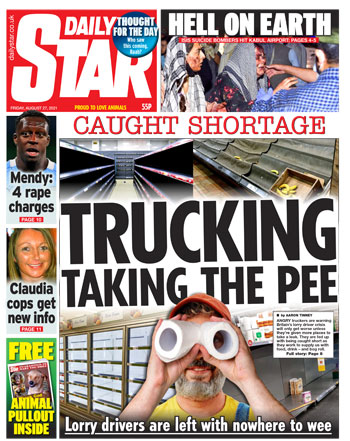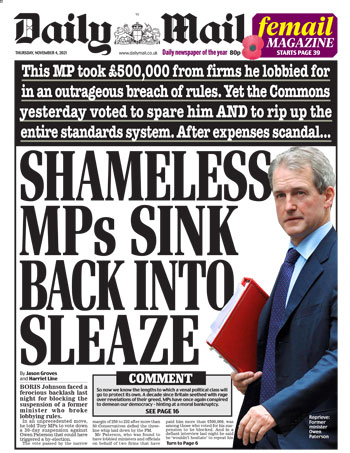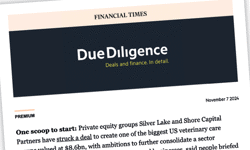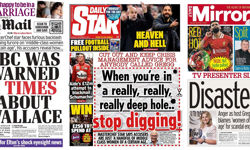
How’s Christmas shaping up? Will there be turkey on the table and, if there is, will it be British? Will there be pigs in blankets? Will there be wine? Will there be toys for the children? Does it matter if the answer to any or all of the above is ‘No’?
Newspapers seem to think it does. “Saving” Christmas has been a recurring theme for many of them for the past four months, whether it’s from new Covid restrictions that will keep families apart as happened last year, or from shortages of the goodies we like to indulge in. As ever, Boris Johnson is the centre of attention. For some, he’s the one who’ll be doing the saving; for others he’s the one responsible for the perceived threat.
Rarely has a prime minister presided over such a maelstrom of crises, from the pandemic to the petrol pumps, from full-to-bursting hospitals to empty supermarket shelves, from soaring gas prices to shrinking supplies of carbon dioxide. And then there’s Brexit. Since “Brexit proper” at the turn of the year, we’ve had vaccine wars, fishing wars, visa wars, holiday wars, football wars and sausage wars, plus the threat of conflict over bottled water, electricity and British TV shows.
There has also been a lack of pub staff, care home workers, hotel cleaners, lorry drivers, slaughtermen, vets, bouncers, fruit pickers and vegetable packers. Depending on your standpoint, these shortages are the result of the pandemic, Brexit, lazy British workers or businesses that pay their directors a fortune and their shopfloor staff a pittance.
On top of all that, there has been the withdrawal from Afghanistan, the lobbying scandals, the shaming of cabinet ministers, and the claims of corruption and cronyism pervading everything from Covid contracts to public appointments and peerages.
The sheer variety and diversity of these “challenges” has been a godsend for all sectors of the Press, whichever corner they occupy – right or left, leave or remain. Papers can pounce on matters that most outrage them, bury those that most embarrass them.
This led to some spectacular cherry-picking in coverage once empty shelves and petrol station queues forced the story on to every front page.
Driver shortages
Take lorry drivers, for example. Everyone agreed that the fact that hauliers had 100,000 driver vacancies was at the root of many of the shortages we have faced this year. But what caused this shortfall? There were many factors, as Sarah O’Connor spelt out in the FT: pay and conditions, an ageing workforce in an industry that was unappealing to younger people, inadequate facilities on the road, an exodus of European drivers after Brexit and during the pandemic, the pause in testing new drivers because of Covid, to name but a few. This led to some spectacular cherry-picking in coverage once empty shelves and petrol station queues forced the story on to every front page – not least the Daily Star, which splashed on “Caught shortage…taking the pee”, focusing on the absence of loos for drivers.

Even if it is not the primary cause, there is a general acceptance that Brexit has exacerbated the situation, and remain-supporting outlets have been quick to point out that Northern Ireland, which is still in the single market, has not suffered in the same way as the mainland. Yet the Sun, Mail and Telegraph all managed long and detailed stories about the problem without mentioning the B-word once. When, eventually, the Express and Telegraph confronted it head on with “Don’t blame driver crisis on Brexit” and “Brexit not to blame for truck driver crisis”, it was coronavirus that was the villain; or the haulage business, for being “drunk on cheap foreign labour”; it was a global issue – look at the situation in America. Yet, somehow, emergency visas for European drivers would be the solution to a problem that had “nothing to do” with Brexit or freedom of movement. Quite how they reconciled those two thoughts is anyone’s guess.
Over at the Mail, striking unions and working from home were culpable – too many DVLA staff were absent from their desks so that there was a huge backlog of licence applications that weren’t being processed. That line was picked up elsewhere: if only the DVLA could get its act together, the driver shortage would be solved at a stroke. This was on the basis that there were 54,000 HGV applications, including 50,000 renewals, stuck in the pipeline. But other news outlets reported that drivers waiting for their renewals were being allowed to carry on working for up to a year. So not quite such a dramatic / easy fix then.
The Mirror, perhaps not wanting to point the finger at trade unionists, meanwhile ignored the HGV licences aspect of the DVLA backlog and instead ran a story on the “waste” of £1m of taxpayers’ money in binning a stockpile of blank driving licences bearing the EU stars that have now been replaced with UK branding. This included a quote saying this was yet another example of the absurdity of “severing ourselves from our closest neighbours”.
The Sun, Mail and Telegraph all managed long and detailed stories about the problem without mentioning the B-word once.
Sleaze returns
This cherry-picking has not been confined to the various shortages, but has also been in evidence in the political crises over the past year as papers push their own agendas – and the prime minister has found that his “friends” in the Conservative-supporting press can be distinctly unfriendly. The Express might think that he “solved” the “social care crisis” by promising some more money in a few years’ time when he may not even be in office to deliver, but the Mail was more sceptical and the Telegraph distinctly unimpressed by the idea of higher taxation.

The Telegraph put all its weight behind Owen Paterson as the government tried to block his suspension from the Commons for breaking lobbying rules, and consigned the ensuing sleaze debate to the page one nibs, but the Mail was damning with “Shameless MPs sink back into sleaze”. That said, it still managed to avoid using the word “Tory” in either the splash head or its very long overline.
The Sun kept the story off the front page, judging that readers would (or should?) be more concerned about a Countdown spat, Geoff Hurst having a pacemaker and the football results. But this was a shallow-grave burial. The attempt to rip up the parliamentary standards rulebook was covered on page 2 – the go-to slot for worthy / duty / uncomfortable political stories – with headlines focused on the anger at a Tory “stitch-up” and an intro in which the prime minister was accused of making it “a dark day for democracy”.
It was, of course, the Sun that broke the Matt Hancock story, the Mail that went for Johnson over his flat decoration and Dominic Raab for being “too busy” on holiday to deal with the Afghan crisis, the Sunday Times that splashed on how a £3m donation to the Conservatives was apparently the going rate for a peerage. All Tory-backing papers making life more difficult for a Tory government.
The Express has stayed true through thin and thinner – “Boris backs Hancock over affair with aide”, “Big hearted Britain to take 20,000 refugees” – although even it had its loyalty stretched to the limit over the suspension of the triple lock pension increase and Johnson’s failure to turn up for the sleaze debate. For once it abandoned the chummy “Boris” to chide him: “Just say sorry for the mess, Prime Minister”.
But these papers have also turned a blind eye to soaring Covid infection rates, urging people to get back to work, resisting masks, social distancing and other limits to people’s “freedoms”. Our vaccination programme made us “world leaders” and they seem reluctant to sully that image with stats showing other countries overtaking us in the number of people jabbed or lagging far behind us in the number of people dying or in hospital.
Our vaccination programme made us “world leaders” and they seem reluctant to sully that image with stats.
Tribal loyalties
The Brexit-backing papers have rejoiced in “booming” Britain, hailing a £1bn trade deal with Australia and a £1bn investment from Nissan as though they were huge sums of money, studiously ignoring the fact that between them, these “boosts” would barely cover half the cost of reinstating the triple lock that so exercises the Express – let alone dent the £37bn test-and-trace bill.
When The Guardian published its Pandora Papers series in October, everyone picked up on Tony Blair saving £300,000 in stamp duty, but the Sun, Telegraph and Express lost interest when the spotlight switched to Tory donors with Russian links.
Newspapers of all political leanings have always played down stories that put “their side” in a bad light and pumped up those that damage their opponents – the Guardian demoted its prized Pandora property to splash on business attacking Johnson’s “bombastic and vacuous” conference speech; the Mirror made great play of Johnson’s Marbella holiday. But they also have their bigger long-term agendas.
While Conservative papers might claim to be showing their independence, to be serving the reader, liberty and democracy in attacking “sleaze” or Covid restrictions or spending plans, they are actually playing on perceived government weak spots to further their own objectives. This is quite the high-wire act, but it is the reader who is left feeling giddy from trying to work out how the good guy is suddenly the bad guy and then the good guy again. They can afford to do this because we are three years from a general election.
Take The Times. It held its nose to urge Conservative party members to install Boris Johnson as their leader and then encourage voters to keep him as prime minister because it couldn’t bear the thought of Jeremy Corbyn in No 10. Over the past year or so, it has developed a habit of presenting stories from Johnson’s perspective – “PM to defy rebels over tax rise for social care”, “PM to reveal minimum wage rise in a few weeks” – but it has also been strident in its criticism of him in the comment pages and editorials. It won’t weep if he is toppled. Nor will the Mail, Sun or even the Express – just so long as they have time to get behind whoever succeeds him before the country goes to the polls. If he stays in place, they will suddenly forgive all his sins and fall in four-square behind him.
The same is equally true of the Guardian and Mirror. The Guardian spent years bashing Corbyn, then expected readers to vote for him. The Mirror spent years bashing Cameron and Osborn, then expected readers suddenly to swing behind them and vote for remain in the referendum. Both are firmly behind Starmer. For now.
For all they rail against tribalism in other media, tribalism is all for most of Fleet Street (the FT, Independent and i being the exceptions) and no leader is bigger than his or her party.
Which is why, if he wants to keep his press supporters onside after a turbulent year that has harmed rather than enhanced his reputation, Boris needs to make damn sure he saves Christmas.
For all they rail against tribalism in other media, tribalism is all for most of Fleet Street.
Liz Gerard writes a fortnightly column for our InPubWeekly newsletter, which you can register to receive via our website.
This article was first published in InPublishing magazine. If you would like to be added to the free mailing list, please register here.












